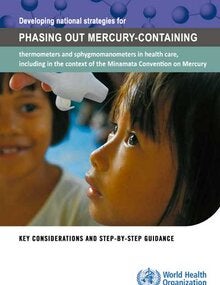Overview
Mercury is a naturally occurring heavy metal which has been used since ancient times. It is also a significant health hazard.
Mercury vapour, when inhaled, can affect the central nervous system and, depending on exposure levels, can impair cognition and in some cases cause death. Mercury is also harmful if absorbed through cuts and abrasions of the skin. Of even more concern in terms of public health is the toxicity produced when mercury emitted into the environment accumulates in lake, river, stream and ocean sediments. There, anaerobic organisms digest and transform it into methyl mercury, a more toxic form of mercury which accumulates and becomes concentrated up the food chain in plankton, fish, birds and mammals including humans. Methyl mercury is of special concern for foetuses, infants and children because extraordinarily low doses impair neurological development.
Exposure to elemental mercury in health care settings from spills or broken equipment, such as mercury-containing fever thermometers and sphygmomanometers (blood pressure devices), is a serious health problem for employees, patients and visitors as well as those tasked with repairing and cleaning up such broken equipment. It is also a problem that is entirely preventable through the careful choice and use of mercury-free alternatives.
Many hospitals and health facilities, including those participating in WHO and Health Care Without Harm collaborative efforts to promote mercury-free health care, have already successfully switched to mercury-free thermometers and sphygmomanometers. A number of governments representing low-, middle- and high-income countries have also instituted policies for phasing out such devices in favour of accurate and affordable alternatives.
By signing of the Minamata Convention on Mercury in Kumamoto, Japan in October 2013, governments made a commitment to protect human health from anthropogenic emissions and releases of mercury and mercury compounds. The role of ministries of public health and WHO in supporting the implementation of the Convention, including actions to be taken within the health sector, was further affirmed by the Sixty-seventh World Health Assembly in resolution WHA67.11.1 The Convention sets a phaseout date of 2020 for the manufacture, import and export of mercury thermometers and sphygmomanometers. This guidance provides advice to health ministries on the leading role they will need to take in this regard.
|

